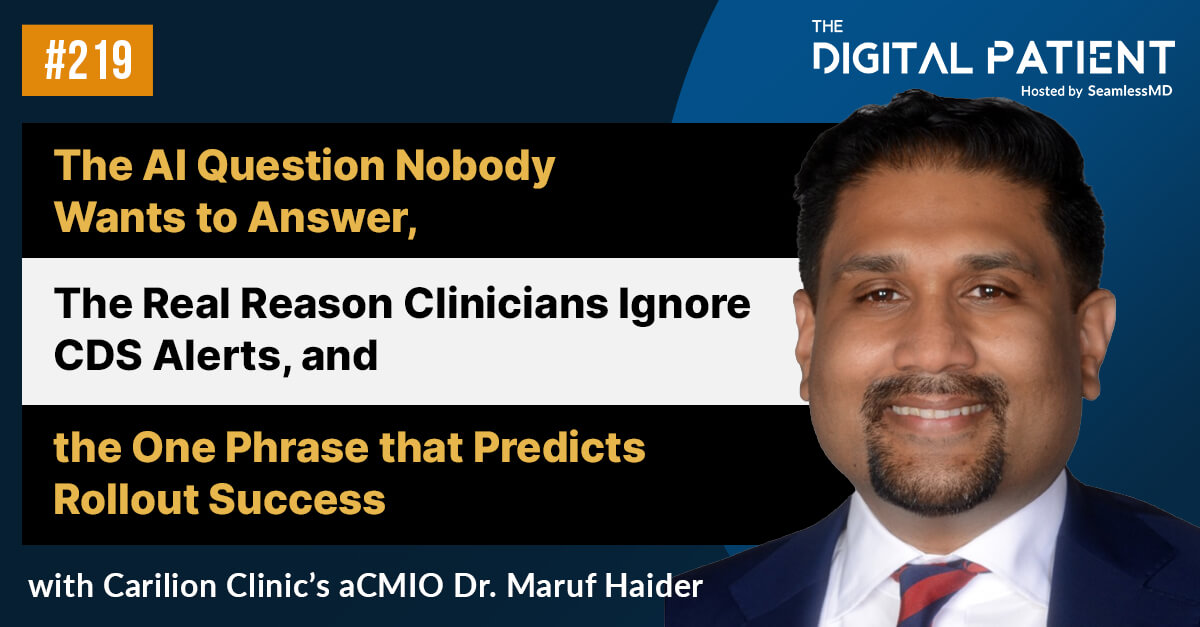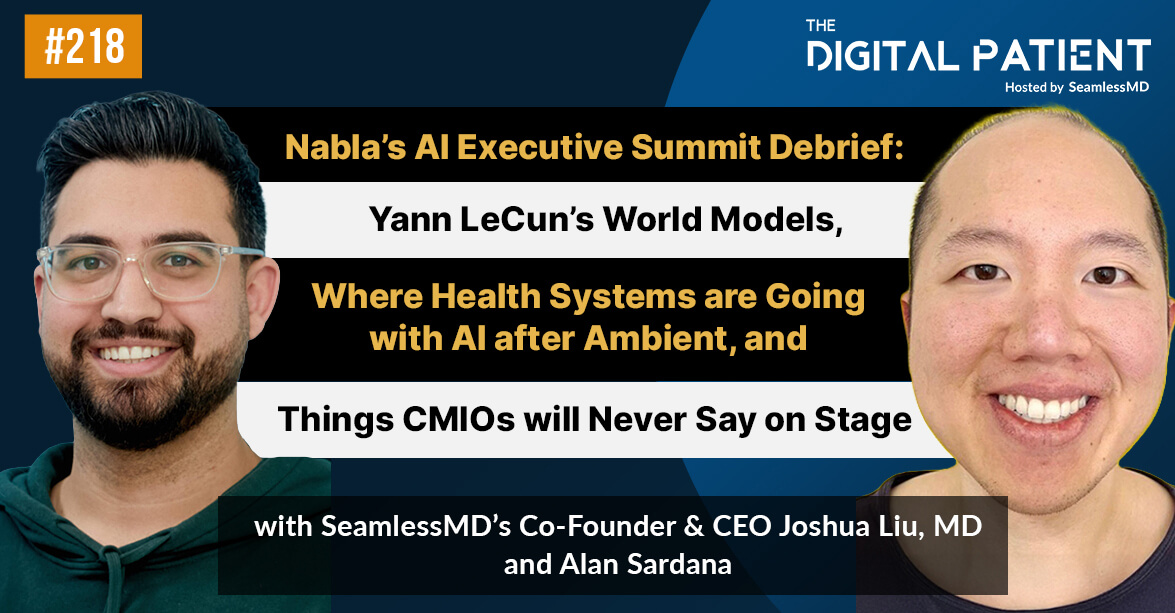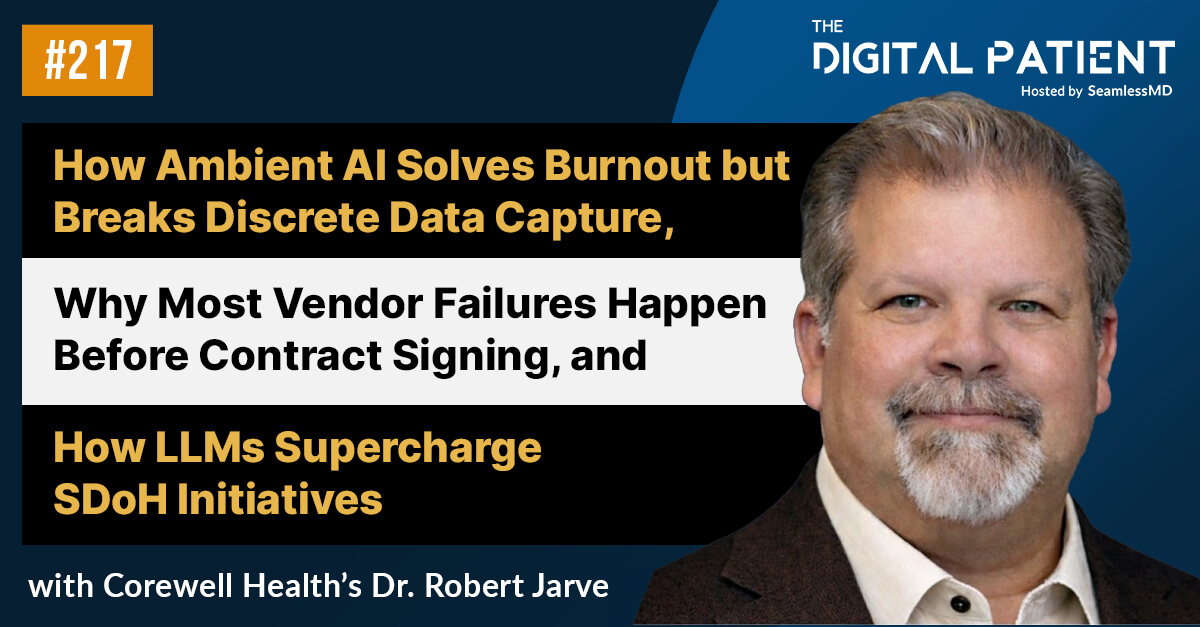In 2021 MultiCare Health System, a 12-hospital system in Washington, embarked on a journey of Digital Transformation for patient care journeys. By leveraging SeamlessMD, a digital care journey platform, MultiCare has been automating patient education and remote monitoring for orthopedics, women’s health, urology, bariatrics and more.
__min.png)
The results have been stellar, including enhanced patient satisfaction, lower length of stay and readmissions, higher profitability and lower costs.
Recently two MultiCare leaders - Jake Dixon, Assistant VP, Surgical Specialties and Ashley Barrett, Assistant VP, Medical Specialties - spoke at Modern Healthcare’s AI and Digital Health Virtual Briefing to share insights and lessons learned for other health systems considering a similar path.
While you can watch the recording here, in this article we’ll summarize 9 key lessons Jake and Ashley shared.
1. Digital patient engagement and proactive monitoring yields improved clinical outcomes and financial performance
SeamlessMD’s ability to facilitate automated engagement and proactive patient monitoring demonstrated significant benefits. Jake highlighted, "Having a proactive prompt for [patients] to report their progress and include that information allows us to get ahead of issues more quickly than we might have otherwise if we waited for the patient to call us." This emphasizes the importance of early intervention through remote patient monitoring.
How good can the results be?
As Jake put it: “Results any chief financial officer would jump at: increases in net profit and contribution margin on hip and knee surgeries, decreases in length of stay for hip and knee and bariatrics, as well decreases in readmission rates. It's pretty easy to look at those numbers and understand the impact.”
__min.png)
2. SMART on FHIR integrated dashboards streamlines remote patient monitoring
Via a SMART on FHIR integration that embeds SeamlessMD’s remote monitoring dashboards directly in Epic, the integrated offering enhanced communication between patients and providers. Ashley noted, "[If] the patient calls, speaks to one of our triage nurses, they can pull this up within Epic and look at, has the patient been monitoring their post op course or post delivery cours… so they have data and can better help answer the patient's question and guide them to what they need… we are catching things sooner and providing better care to our patients.”
__min.png)
3. Automated patient enrollment via EHR integration is a game changer for clinical workflows
Transitioning from manual patient enrollment to an automated process proved to be a significant workflow enhancement for MultiCare. MultiCare did an HL7 integration that sends data from Epic into Seamless to automatically enroll patients at MultiCare from Epic onto the SeamlessMD platform. This automated enrollment significantly reduced manual efforts and improved the efficiency of onboarding patients.
Ashley highlighted how automated enrollment at specific points in the patient journey, such as pregnancy confirmation, became a "game-changer" for minimizing staff time. This lesson underscores the importance of minimizing friction in clinical workflows to encourage broader adoption of digital tools.
4. Patient-reported outcomes can be leveraged to measure operational and quality metrics
The impressive outcomes reported by Jake, such as a 62% reduction in patients self-reporting the need to call providers, highlight the significance of patient-reported outcomes as a quality metric. Jake acknowledged, "Almost 20,000 patients have gone through, with 87% of patients recommending Seamless." This lesson emphasizes the impact of digital tools on patient satisfaction and engagement.
5. Choosing technology partners who are collaborative and responsive
Jake underscored the importance of selecting a digital care partner wisely, emphasizing that the success of such initiatives hinges on collaboration and responsiveness. He noted, "the success of it will really ride on your ability to collaborate and create alongside one another… and be responsive as issues come up… I'm grateful that we have a partner that does that and continues to iterate with us and is very much a part of our journey." Collaboration with a nimble partner allows for quick adjustments based on feedback, ensuring the digital solution remains relevant amid the dynamic healthcare landscape.
6. Purposely and efficient use of stakeholder time is key to a successful implementation
Ashley emphasized the significance of intentional and purpose-driven communication during the implementation phase, sharing the “Seamless team, from a project management team standpoint, did a great job. There was purpose and intentionality with each touch base and not everyone had to be involved every time." This approach involves keeping meetings focused on specific goals and involving only those necessary for each step, ensuring productivity and progress.
7. Broad stakeholder engagement is critical to leverage a digital care journey platform to standardized care pathways
Leveraging a digital care journey platform was an opportunity for MultiCare to deliver more standardized, best practice care for each service line. Of course, there can be skepticism when different regions may deliver care slightly differently. Overcoming this skepticism involves transparent communication about the collaborative nature of the implementation.
To tackle this in the bariatrics service line which operates a couple different regions, Jake told his team: “We will develop this together and where there is explainable and relevant variance, we can move forward with the variants. But otherwise, it's an opportunity to ask those questions to see if we can align.” This approach ensures that healthcare providers feel included in the implementation process, fostering a sense of ownership and engagement.
8. A multidisciplinary steering committee is critical for a enterprise-wide Digital Health solution deployment
Managing an enterprise-wide rollout of a Digital Health solution requires a multidisciplinary approach to governance. Jake discussed the importance of involving physicians, administrators, patient experience, digital leadership and hospital leadership on the same SeamlessMD steering committee. This diversity ensures a comprehensive view of the impact of the initiative on both outpatient and inpatient settings. The involvement of various stakeholders allows for better evaluation of performance and the ability to address issues promptly.
9. Inclusivity and open-mindedness are keys to success
Ashley advised other health systems to encourage everyone to approach digital care journey initiatives with an open mind and inclusivity. In a dynamic healthcare environment, change is inevitable, and success lies in embracing opportunities for growth and improvement.
Encouraging teams to view the implementation as an opportunity to constantly improve and meet patients where they are fosters a positive mindset. Ashley highlighted how health systems should ask themselves: “How can we be that center of excellence? How can we be that patient's first choice and encourage your teams? It's amazing that going into it with that perspective, the outcome was.”
Conclusion:
MultiCare’s experience with SeamlessMD offers valuable lessons for healthcare providers navigating the complexities of implementing digital care platforms. As healthcare continues to embrace digital transformation, these lessons serve as a beacon for organizations seeking to optimize workflows, improve patient outcomes, and deliver high-quality care.
To learn more, watch the recording here.
.svg)










.png)
